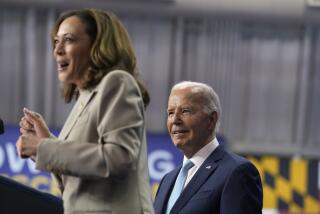Farmers Blame U.S. : New ‘Korean War’ Is Over Beef Imports
- Share via
ANSONG, South Korea — In the old warehouse that he remodeled into a four-room home, Kim Jin Hwang pulls out a pile of English-language pamphlets to show how he has taught himself to be a cattle farmer.
Kim, 39, a youthful-looking former army captain, is proud of his accomplishment. By struggling through the pamphlets, issued by American breeders, Kim, who does not speak English, has learned all about such matters as breeding and artificial insemination.
But Kim would prefer that imports from the American cattle industry be limited to breeding materials. He and the other cattle farmers of this region of rolling plains sculptured with rice paddies and surrounded by mountains, 40 miles south of Seoul, are fighting mad.
Distrust and Rage
Filled with distrust of the South Korean government and rage at the U.S. government, the Ansong farmers have become the front line of rising resentment sweeping through both the cities and the countryside against U.S. threats of retaliation if South Korea fails to open its markets. And beef has become a major symbol of the anger.
“If I had known you were coming,” Lee Chae Moon, 40, the father of four children, said glowering, “I would have prepared some rotten eggs to throw at you. Even seeing the face of an American turns my stomach nowadays.”
Since Roh Tae Woo was elected president last December, demonstrations by the Ansong farmers have caused more trouble than student protests.
Protests Staged
Waving banners reading, “Should Korean Cattle Farmers Die to Make American Cattle Farmers Happier?” and tossing cattle manure, they have demonstrated in front of the National Assembly, the Agriculture Ministry and the U.S. Embassy, and they raided the headquarters of the governmental Korean Development Institute.
The institute became a target because a researcher there advocated on television that South Korea open up its beef market.
“If there is anyone in Korea who argues for allowing beef imports, we will seek them out,” Kim vowed. “Farmers haven’t staged a revolt in a hundred years. But there will be one this time if the market for beef imports is opened.”
“We will fight the import of beef with our lives,” Lee added.
Imports of high-quality, grain-fed American beef, which amounted to 2,400 tons worth about $5 million in 1984, were cut off unilaterally by the South Korean government in 1985 and not an ounce of American beef has entered the country since.
U.S. trade officials regard the ban as a flagrant violation of a 1979 General Agreement on Tariffs and Trade (GATT) pact. In the last two months, they have launched a two-pronged strategy threatening retaliation through both GATT and a U.S. trade representative’s investigation of a formal complaint filed by the American Meat Institute alleging unfair trade practices.
In mid-April, Agriculture Minister Yun Kun Hwan hinted that Seoul might yield, at least in part, to U.S. demands. He noted that domestic prices for beef cattle had risen and said that South Korea might need to import 14,500 tons of beef to meet this year’s demand. He also promised to announce, at an unspecified date, “comprehensive measures” on the beef issue.
Recovery Sought
If farmer Kim has his way, no American beef will come in until cattle farmers have a chance to recover from the chaos that the government of former President Chun Doo Hwan brought to the beef market between 1982 and 1984.
In those three years, the Agriculture Ministry and the Saemaul (New Community) Movement--led at the time by the president’s brother, Chun Kyung Hwan, who was indicted for embezzlement and other financial irregularities April 16--imported tens of thousands of head of cattle. They staged a nationwide campaign to persuade farmers to increase their herds, and provided loans--at a 14.5% interest rate--for cattlemen to buy more cattle at prices above import cost but still below domestic prices.
As a result, the number of cattle more than doubled to 2.9 million at the end of 1985 from 1.3 million at the end of 1981, and South Korea, which had imported as much as 50,000 tons of beef, or 40% of its demand, found itself awash with beef. Prices for cattle plummeted by more than 50%, leaving farmers unable to repay their loans. In an attempt to rescue them from the deluge it had induced, the government cut off imports.
Urged to Buy Imported Cattle
The Ansong cattle farmers said the Agriculture Ministry urged them to buy imported cattle weighing around 550 pounds at about 850,000 won ($1,149 at the current exchange rate) between 1982 and 1984. But after spending as much as $811 to feed them for a year, they were forced to accept prices as low as $1,081 when they sold them.
Now, Kim says he would like a chance to pay off his debts and get back on his feet without the threat of imports disrupting the market. Handouts are not his game, he said.
Asked about a promise by Kim Dae Jung, one of the opposition’s losing candidates in the Dec. 16 presidential election, to wipe out all farmers’ debts if he were elected, farmer Kim snorted and said, “Impractical.”
“That would reward lazy farmers who have made no effort to pay off their debts and penalize the diligent ones who have tried to pay them off,” he added. “Responsibility is part of democracy, too.”
‘Too Many Cattle’
Two officials of the Agriculture Ministry refused to be interviewed but Kim Chun Bae, vice chairman of the National Livestock Cooperatives Federation, admitted that “too many cattle were imported.”
Now, after three years of trying to cut down the number of cattle, “the supply and demand situation is just beginning to come back into balance,” he said.
“The farmers at long last are just coming out of a long, dark tunnel of hardship when suddenly an avalanche of stones is about to fall on them,” farmer Kim said. “On a government-to-government basis, we may have promised the United States to open the market (by the end of 1987), but the farmers just found out about it now.”
“If farmers reach the conclusion that they will lose money, they will stop raising cattle and the whole foundation of the livestock industry will collapse,” he added.
Used American Pressure
Kim also noted that radical students were using American pressure on the beef issue to whip up anti-American feeling in the general populace.
With per-capita beef consumption at a minuscule 7.9 pounds per year--even less than Japan’s 9.9 pounds and insignificant compared to the 103 pounds for Americans--”the Korean beef market is very shallow,” Kim said. “It’s like an accordion--just a little bit of oversupply will have a great impact on the market.”
Kim’s farm is a mere 4.7 acres, but it is one of the bigger ones in South Korea. Even with a debt of nearly $20,000, Kim counts himself better off than most of the 854,269 households--roughly one in every two farming families--that make up South Korea’s cattle industry.
Of those households, more than 81% raise only one or two head, Kim said. His herd of 19 2-month-old calves and 16 Holstein dairy cows is also relatively large.
Grew Up on a Farm
Kim became a cattle farmer after leaving the army because “I grew up on a farm and always loved animals.” He bought his farm with savings and his army separation allowance, and now he earns $1,891 a month from milk sales.
“In Korea, the average yield of milk per cow is 4,700 kilograms a year. In the United States, it’s 7,700 kilograms, but,” Kim said proudly, “I get more than 8,000 kilograms (17,600 pounds).”
Kim’s pride also shows in the immaculate barn that he and his wife clean every day after milking the cows at sunrise and sunset. It shows, too, when he mentions that his 10-year-old son finished second in his third-grade class last year, and his 9-year-old daughter’s skill at playing the upright piano that fills a corner of the Kims’ tiny living room.
Sitting on the ondol floor, heated by flues underneath, his wife said, “This life could be very good--if we could just make ends meet.”
Feed Animals Leftovers
Most of South Korea’s cattle farmers feed their animals leftovers from the family dinner table and farm byproducts. But the rest, because of hilly terrain and lack of grasslands, must rely upon cattle feed, most of which comes from the United States, Kim said.
He said 70% of his milk income goes to pay for feed. Only by putting off repayment of his loans does he keep going.
Even his livestock association, Kim Chun Bae said in Seoul, has no estimates for the cost of raising cattle. But if prices for cattle sold for slaughter are used for comparison, Korean costs are 2.4 times those in the United States, he said.
“If you use what the cattle farmers think they ought to receive for selling their cattle as a yardstick, the price ought to be between 1.4 million won ($1,891) and 1.5 million won ($2,027)” for an 18-month-old, 880-pound steer, he said. At the peak in 1984, shortly before it became clear that the market was about to be deluged with beef, the price for a steer reached $2,121, Kim said.
A milk cow is usually slaughtered here at 5 years of age, he added.
Beef Sold in Chunks
In most retail shops, beef is sold not in slices or cuts but in 1.3-pound chunks indiscriminately chopped off a carcass at about $4.50 a pound.
In Washington, U.S. trade officials say the current impasse over beef stems more from politics than economics. In their view, Korean beef producers are an inefficient, protected minority that wields political clout far in excess of its contribution to South Korea’s rapidly developing industrial economy.
“South Korea is now achieving great economic growth and is becoming a major player in the global world trading system,” said Kelly Winkler, an aide to Clayton K. Yeutter, the U.S. trade representative. “Therefore, their ban on imports of U.S. beef not only fails to uphold that responsibility but also fails to live up to their commitment in 1979 in the Tokyo Round (of GATT negotiations). We have been patient since May, 1985, and our patience is wearing thin.”
Boycott Launched
So is patience on the other side. Although the livestock association, unlike agricultural cooperatives in Japan, has made no threats to cut back on imports of American feed, the Ansong cattle farmers already have launched a movement to boycott other U.S. goods.
“We have stripped this (co-op) office of everything that came from the United States,” farmer Lee Chae Moon said.
The farmers also have halted purchases from the Purina Co., the only U.S. firm producing cattle feed in South Korea through a joint venture, Kim noted.
“If the United States can wait a few years, the problem will solve itself automatically,” Kim said. “We’ll increase our cattle raising, but we can’t expand in an unlimited fashion.
“In the meantime, living standards will increase and Koreans will eat more beef,” he added. “If the United States would just wait a few more years, Korea would import beef without the Americans asking. So why put pressure on us now?”
Kim said he believes the United States was misled by what he called “Korean government propaganda” depicting rural living standards in South Korea as on a par with urban standards.
“It just isn’t true,” he said.
Times staff Writer Oswald Johnston, in Washington, contributed to this article.
More to Read
Sign up for Essential California
The most important California stories and recommendations in your inbox every morning.
You may occasionally receive promotional content from the Los Angeles Times.










